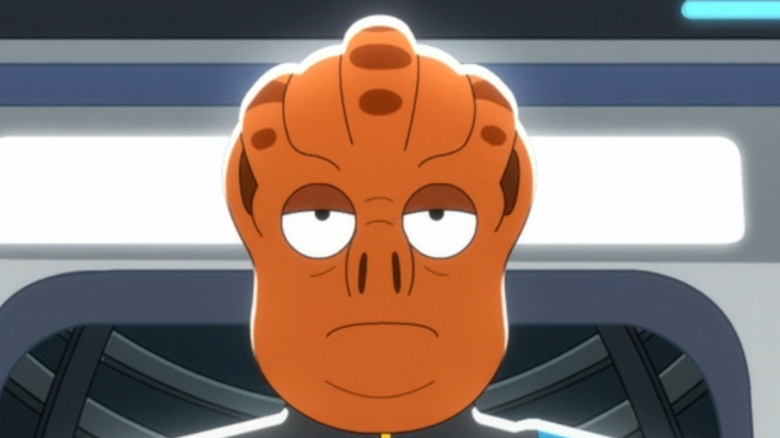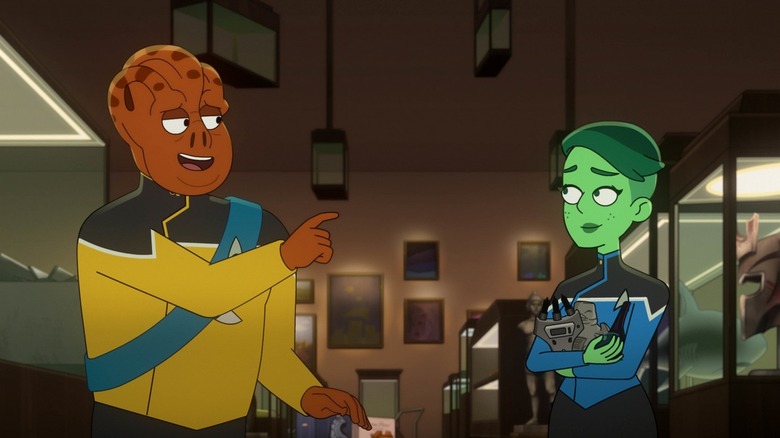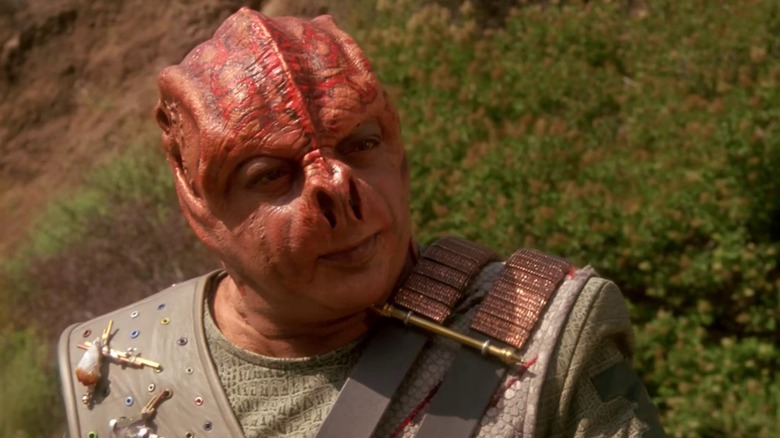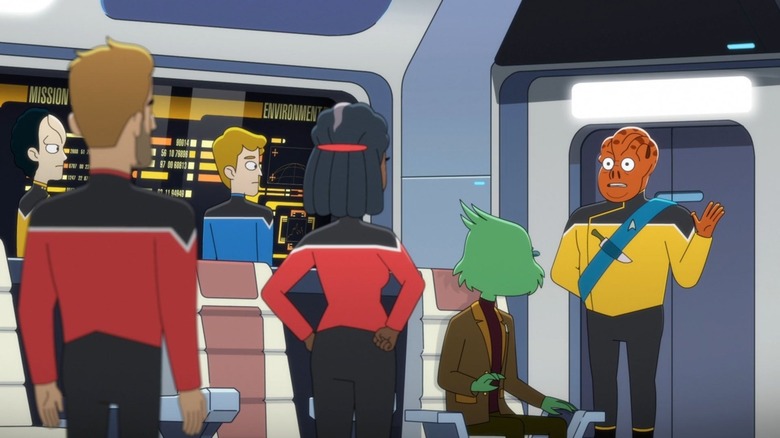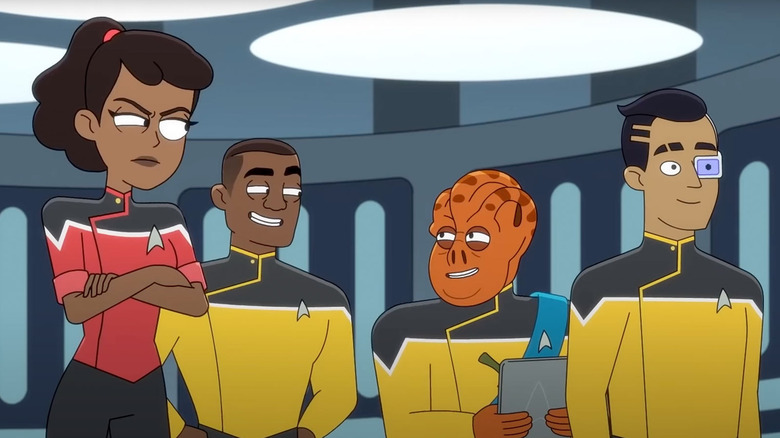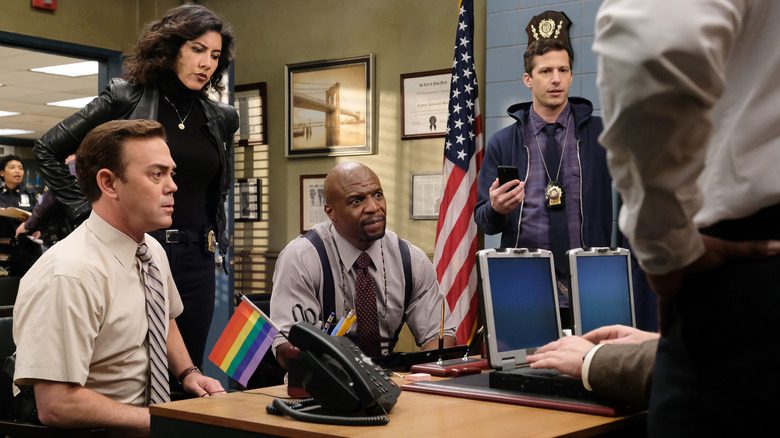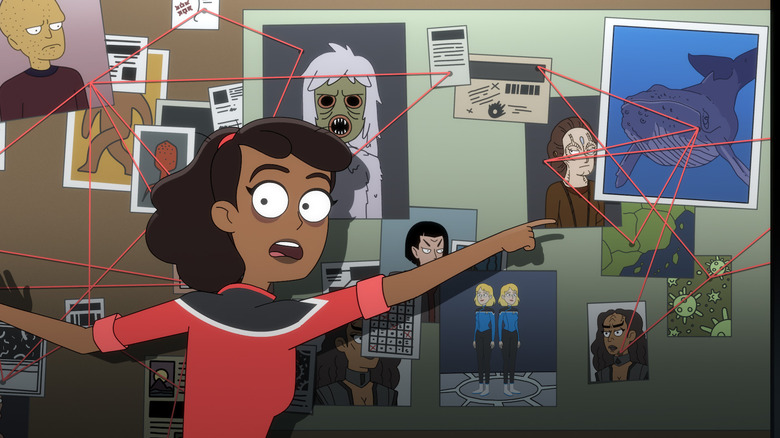Carl Tart Reveals How He Brought Tamarians Back To Star Trek - Exclusive Interview
"Star Trek: Lower Decks" is a series made for people who have obsessively watched every "Star Trek" show, read every tie-in novel, and at least considered owning all the many (often highly questionable) action figures. The show is, simply put, a feast's worth of Easter eggs. In some cases, "Lower Decks" has blown past simple references and worked to reinvent previously discarded races. Much like "Deep Space Nine" turned the oft-mocked Ferengi into complex, three-dimensional figures, "Lower Decks" did something with another "The Next Generation" foe, the Packleds.
The Packleds went from one-off dimwits to a genuine threat against the Federation in "Lower Decks" Season 1. With Season 2, the show is bringing back a beloved alien race which only appeared in one episode. The Tamarians' only appearance up until now was the "TNG" episode "Darmok," during which Jean-Luc Picard (Patrick Stewart) is beamed down to a planet to fight a beast with a Tamarian captain in order to learn the Tamarian language and build a lasting peace.
Now, 20 years later, "Lowe Decks" has finally introduced Kayshon, the first Tamarian member of Starfleet. Looper sat down with Carl Tart, the actor who voices Kayshon, to find out how much research goes in to playing a Tamarian.
How Cart Tart became Kayshon
In a week, it's going to be the 20th anniversary of when the episode "Darmok" from "Star Trek: The Next Generation" first aired.
Oh, wow.
Up until this moment, that's the only time that the Tamarians have ever appeared. How did you come in to play Kayshon and bring this race back?
Well, I have some friends who are writers for the show that recommended me to be this. I guess they felt that I could carry on this character. And so I sent in an audition tape and they liked it. I definitely watched that episode to get some inspiration and to see how it's supposed to be done, and I hope I'm doing a good job.
Was this an introduction of "Star Trek" for you? Had you known a lot about the show prior to this?
This is the most I've been a part of it, definitely. Growing up, I watched "The Next Generation" a little bit, and my stepdad was a big fan of "Deep Space Nine." So I'd watch that every now and then — if I came out into the living room when he was watching it, I'd see some of it, but I didn't grow up watching it that much.
Learning the Tamarian language
What did the "Lower Decks" team tell you when they said, "Hey, we want to bring this race back"? What was the pitch to you?
The pitch to me was "Watch this episode and see if you can do this." And I was like "Cool." And then I saw it was Paul Winfield, and Paul Winfield's such a great actor. And so I was like "Yeah, I'm in. Like, if you'll have me, I'm in."
The Tamarian language is surprisingly robust. There's more to it than most people probably realize. Did you prepare? Did you learn what some of those phrases meant? I know you're a writer and an improvisational performer, too. Have you had a chance to sort of have an impact on the language?
No, I'm not even going to say that. That's all the writing. I definitely had to study quite a bit. And during the recording sessions, we had to drill certain words and certain things to make sure I got it correct, because [fans are] serious about it. So I didn't want to mess anything up. But yeah, that was interesting to just kind of — when I first received the scripts and received what I was going to be saying — I was like "Oh, okay, it's going to be hard for me to practice this," but the writers are so cool and they're so immersed into it and they know how it goes. They helped me a ton.
What Kayshon's language means for Star Trek and in real life
It doesn't actually seem like the universal translator does much to change what Kayshon is saying, because he repeatedly corrects himself. The Tamarian language is memetic and poetic, so the listener has to know the references to understand what's really being said. So the thing that I got off of it, and I'm curious to see if you also felt this, is that Kayshon kind of has to code switch for work.
Yeah. Yeah. There's a little bit of that going on. He's trying to fit in, and that happens when you're different in a space. So yeah. He has to fit in. He's trying to fit in, he's doing his best, but he is who he is. And I think what's so cool is that the people are so nice that, even though they're sometimes like "That was weird," they're really cool to him.
It's interesting that they're trying to speak the language.
Mm-hmm.
And in some of the upcoming episodes they don't always succeed, which also, again, feels very true to life.
Mm-hmm. Yeah. Definitely.
Who Carl Tart learned from while working on Lower Decks
Understanding that the work process is a little bit extra because of COVID, you said you've been building relationships with some of the other actors. Who have you been taking cues from, getting to know the show better as you figure out Kayshon?
Well, Tawny [Newsom] is already a friend of mine. She's already a good friend. She's another improvisor and actor and stuff. And then Ben Rodgers, who's one of the writers and who's also been on the show, and Chris Kula, another guy that I know. He's helped me probably the most because he's in every recording session with me. Kula is another UCB guy.
In his very first appearance, Kayshon very off the cuff says the phrase, "Shaka when the walls fell." Which is a pretty dire thing to say. He's saying it just because a lady turned him down. Will he also get to say it for real? Are we going to get some dramatic stuff for Kayshon by the time the season ends?
Oh, I don't know. I don't know. You got to watch. I legit don't know.
Working on Brooklyn Nine-Nine and the show's ending
"Brooklyn Nine-Nine" recently ended. You were a story editor for a little while, and you've worked with Craig Robinson on some stuff in the past, too. What that was it like working on that show? Did you have any thoughts about the circumstances that brought it to an end after its eighth season?
I really enjoyed my time there. I have so many friends that worked there with me. It's a real family affair over there, and I was happy to be a part of it. Everybody in the cast is truly the nicest person ever. And the show that I'm working on right now is actually, I'm on a new series called "Grand Crew" that'll be out early next year — I'm an actor on it. I'm out of the writer's room, but it's from the producers, from the makers of "Brooklyn Nine-Nine." Phil Augusta Jackson, who was in the room at "Brooklyn," is a good friend of mine. And Melissa Fumero directed the episode we just shot.
I think "Brooklyn," it's complicated, but it also ... those folks over there are so cool and nice that I'm happy they got to accomplish something. It's hard to get a show on the air for eight years in today's TV landscape, especially a single-camera show. Multi-cams do a little bit better, but eight seasons, it was revived at NBC. And that was my first season working there, the first NBC season. So kudos to them, man. They're all dope. Stephanie [Beatriz] is super dope. Melissa's super dope, Terry [Crews], like, everybody's dope.
The person Carl Tart wants to join Lower Decks isn't who you'd expect
Can you tell us anything about "Grand Crew"?
Yeah. It's just like a friend comedy with some real-life friends of mine and some new friends that I've made. It stars Nicole Byer and Echo Kellum and myself and Justin Cunningham and Aaron Jennings and Gracie Mercedes, and we all kick it at this wine bar, and hijinx and comedy ensue.
Of the people you've worked with that haven't had a chance to come into "Lower Decks" already, who would you like to see at least make an appearance?
I want Shaq to be on the show.
You want Shaq to be on the show, not you doing a Shaq impression, but just the actual Shaq to just come on and do it?
Yeah.
What would he play?
I don't know. But I just want him there. Maybe he plays somebody in my race.
New episodes of "Star Trek: Lower Decks" stream Thursdays on Paramount+.
